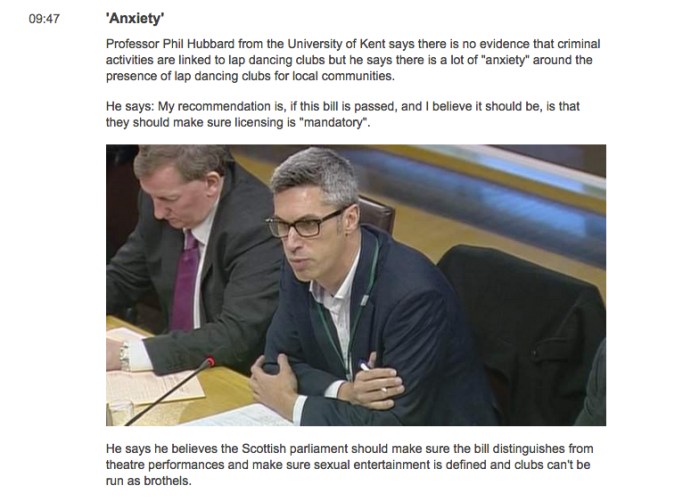Yesterday I provided evidence as part of a roundtable at the Local Government and Regeneration Committee of the Scottish Parliament on the Air Weapons and Licensing Bill 2014</a>, which contains clauses relating to Sexual Entertainment Venues. The range of experts present encompassed a wide range of views of the merits of a new, and separate, system of licensing for SEVs in Scotland which would follow E&W legislation in licensing SEVs in the same way that sex shops are licensed, with the possibility of refusal on the basis of inappropriateness of location, the uses of land in the vicinity or the state of the premise itself.
Regarding the introduction of such a licensing regime in Scotland as a foregone conclusion (noting previous cases which have shown that licensing boards in Scotland must limit their decisions regarding licensing to alcohol issues), I made a series of points which I think would result in a fairer, more robust system of regulation than the adoptive system of licensing in England and Wales:
1. I argued that the new licensing system should be mandatory, meaning all 32 licensing authorities must adopt the powers, and retrospectively adopt the 1982 powers relating to sex shops if they have not already done so. This is to avoid confusion and to encourage consistency of approach, noting there still remains a variegated landscape of regulation in England and Wales that is unhelpful to operators and confusing for the wider public. I think the requirement for local authorities to consult over adoption has been a huge waste of time and money in E&W (not least because many local authorities ignore the outcomes of consultation!)
2. I argued that the definition of sexual entertainment should be modified to read (at 45A, para 3 of the proposed amendments) ‘sexual entertainment is any live performance involving a display of nudity which can be reasonably assumed, whether by verbal, or other means, including advertising, to be provided solely or principally for the purposes of sexual stimulation’. I also argued that an additional clause needs to be added at 45A para 7 indicating ‘This shall exempt any premise resorted to by more than one woman or man for the purposes of prostitution or free fornication’ (something necessary to exclude the possibility that swingers’ clubs, gay encounter bars or massage parlours where sexual services are sold might obtain SEV licences).
3. I argued for striking all clauses in Para 5 subsection 5 making reference to the possibility of nil limits as each and every case needs to be decided on its merits. I find it absurd that local authorities are able to determine localities in advance given the definition of localities will depend according to the fact of the case at the time the determination is made. Nil limits are hence legally unreasonable and indefensible, and place a large burden of proof onto local authority licensing officers who must ‘from time to time’ review any such policy.
4. I argued against bespoke local policy with the legislation simply arguing each case needs to be considered in relation to its merits. There are only 17 or so clubs in Scotland, and if multiple Las are forced to evolve policies for sex establishments this would seem to be burdensome and unnecessary. Instead, the legislation should make clearer what the basis for a refusal of a licence might be. Based on my research on attitudes to SEVS, I suggested inserting, under 5d, the committee may have consideration of ‘the use to which any premise in the vicinity is put, paying particular attention to the proximity of residential premises, educational facilities, spaces of worship and other community facilities
5. I argued that the 1982 Schedule concerning sex shops needs to be modified so that it is clear that conditions can be imposed which relate to advertising and signage in, on and in the vicinity of, a premise.
So my hope is that if the bill is passed, it is in modified form taking on board a recognition that some of the definitions enshrined in the legislation have proved moot in England and Wales, and that the Scottish Parliament enshrine certain guidelines and intentions in the legislation rather than publishing any supplementary or secondary guidance, which is not admissible in legal appeals. This said, most of the discussion revolved around (i) how to distinguish striptease from art and (ii) whether venues offering occasional striptease should be exempt in any way, so I am not sure my messages about legal proportionality, clear definitions and the unreasonableness of nil limits will have any influence on the ultimate Act.
Interesting to see my comments were misinterpreted by some as a call for tighter regulation of lap dancing clubs rather than a fairer form of regulation: there also appears to be a widespread misunderstanding out there about the licensing of massage parlours and a denial that many of these fall into the definition of an SEV as framed in the current law.
See: http://www.bbc.co.uk/news/uk-scotland-scotland-politics-30818950
http://www.heraldscotland.com/news/home-news/licensing-call-over-strip-clubs.1421242115
(from live text coverage of debate)
